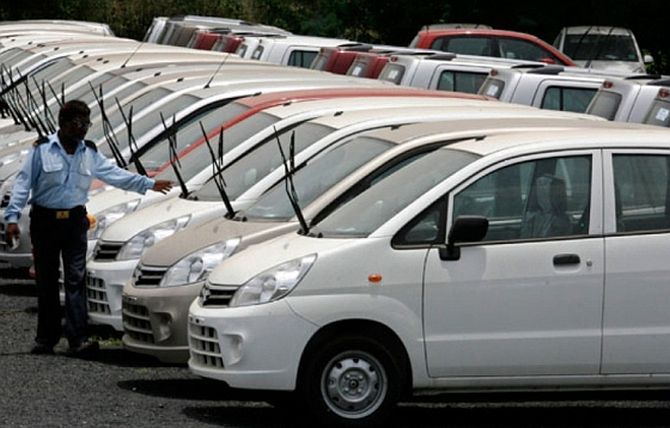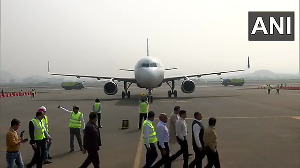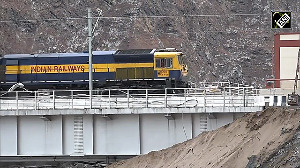 The unprecedented rains in Chennai and adjoining areas also led to huge production losses for auto makers and suppliers, who had made that region a major auto hub.
The unprecedented rains in Chennai and adjoining areas also led to huge production losses for auto makers and suppliers, who had made that region a major auto hub.
Driving smooth on a slow but steady recovery path, the automotive industry came to a screeching halt as the year 2015 entered its last lap -- thanks to a raging debate on pollution control.
The sector is bracing for further bumps ahead in the new year after a roller-coaster ride in 2015 that also saw a record number of vehicle recalls, an unprecedented emission scandal involving German giant Volkswagen and a ban on high-end diesel vehicles in the national capital region.
The unprecedented rains in Chennai and adjoining areas also led to huge production losses for auto makers and suppliers, who had made that region a major auto hub.
At the same time, the industry saw some new launches, including Hyundai Creta, Maruti Suzuki Baleno and Renault Kwid stand out in a market already crowded with numerous models.
Summing up the year 2015, Maruti Suzuki India Chairman R C Bhargava said: "I think the year has been better than the previous year because from 2011-12 to 2013-14 the industry has actually declined by 1 per cent."
He said in 2015-16 the auto industry could see ‘a growth of maybe a growth of 6 per cent’.
"So, it does show that there is a turnaround.
“It's not very big still its a turnaround. It augers well for the future," Bhargava said.
Yet, in a big blow to the auto sector, the Supreme Court banned registration of diesel-run SUVs and cars having engine capacity above 2,000-cc in Delhi and National Capital Region till March 31, 2016 and unveiled a slew of measures to curb the alarming rise in pollution levels in the city.
The move affected all the luxury car makers, including Audi, Mercedes-Benz, BMW, JLR as well as mass market players Mahindra & Mahindra, Tata Motors, among others.
The industry players couldn't hide their disappointment but grudgingly accepted the apex court's order.
"So even if we believe the decision on diesel vehicles isn't optimal, we'll honour it and develop vehicles that comply with their stipulations," Mahindra Group Chairman Anand Mahindra said.
Auto industry body SIAM called for a holistic approach to solve the issue of air pollution in Delhi.
Citing an Indian Institute of Technology study it said cars polluted very less as compared to other factors like dust and burning of paddy fields in neighbouring states.
"There are various sources of pollution which can be measured using a scientific source apportionment study.
“To improve air quality from vehicle point of view we must take a comprehensive view of various factors causing pollution," Toyota Kirloskar Motor Vice-Chairman Vikram Kirloskar said.
Delhi and Mumbai are India's largest markets for luxury vehicles.
According to industry estimates, Delhi accounts for about 20 per cent of total luxury vehicle sales in India.
The Supreme Court order followed an order of the National Green Tribunal, which had banned registration of all diesel vehicles in Delhi till January 6.
The decision ignited calls from the auto companies for a clear policy on fuel and remove uncertainty.
"The one thing industry likes, and all industry likes, is certainty.
“Irrespective of what it is you want to be certain of what is going to happen. Where you get into uncertainty, and whimsical action and changes then it becomes very difficult for any industry.
“Industry needs a stable certain environment," Bhargava said.
Even as pollution became talk of the town, German auto major Volkswagen found itself tangled in a controversy over cheating emission tests. It was found using diesel engines equipped with defeat device in the US and many global markets.
It affected the company in India too and it was made to recall a record 3,23,000 vehicles after a government-ordered probe found it using such diesel engines.
It remains the biggest vehicle recall so far in the country.
Volkswagen ordered the recall after the the Automotive Research Association of India found that diesel cars manufactured in India by Volkswagen having E189 engine were fitted with the ‘defeat device’, which may lead to excess nitrogen oxide emission levels in on-road vehicles.
VW has admitted that 11 million diesel engine cars worldwide were fitted with the software that helped in manipulating emission tests.
It faces fine of up to $18 billion in the US.
Besides, the year also saw some big ticket recall announcements from various carmakers, including Honda Cars, General Motors, Nissan and Maruti Suzuki.
Honda Cars recalled around 224,000 units of its premium sports utility vehicles -- CR-V, sedans Civic, City and hatchback Jazz, manufactured between 2003 and 2012, to replace faulty airbag inflators.
Later, the company also recalled 90,210 units of its sedan City and multi-purpose vehicle Mobilio in India manufactured between December 2013 to July 2015 to replace fuel return pipe.
General Motors India recalled over 100,000 units of Beat diesel to replace faulty clutch level. Maruti Suzuki recalled 33,098 units of its small car models Alto 800 and Alto K10 to rectify defective latches on right side doors.
Nonetheless, the passenger car segment saw its sales grow for 13 months in a row buoyed by several positive factors like low interest rates, low fuel prices and pent-up demand.
However, the positivity was interrupted towards the end of the year due to heavy rains in Tamil Nadu that saw several areas in Chennai and nearby places getting flooded.
Operations of various auto makers, including Ford, Renault-Nissan, BMW, Royal Enfield were impacted due to the flooding of the city and its surrounding areas.
SIAM estimates the production loss at around 15 per cent due to the shutdown of various factories.
Yet, the year will also be remembered for the runaway success of new models like Hyundai Creta and Maruti Suzuki's Baleno.
Honda's Jazz and Renault's Kwid also received a robust response from customers.
As the year came to a close, Maruti Suzuki finally went ahead with much delayed minority shareholder vote to let parent Suzuki own the Gujarat plant.
The minority shareholders approved the move with 89.75 per cent through a postal
ballot that took place between November 16 and December 15.
It also came up with Nexa dealerships to sell premium models during the year.
On the M&A front, Mahindra group acquired Italian automotive and industrial design firm Pininfarina, which is know for its design of the Ferrari and Alfa Romeo models.
PriceWaterhouse Partner Abdul Majeed said: "I do hope we will have a clear policy to address the emission issue as far as the automotive industry in concerned. Automotive industry is a capital intensive industry and certainty in policy is very important for automakers to make required investment."
Still sounding bullish on 2016 Majeed said: "Going forward with the pay commission high there will be better cash flow in the hands of central government employees which also might help the growth."
With these positives there are some negative which might impact the growth such as lower off-tick in the rural economy because of poor monsoon, in the remaining month of this fiscal inflation may go up due to lower agricultural output and there is policy uncertainty as far as diesel vehicles are concerned, he added.
"In 2016-17, I do expect the growth to continue and the rural economy to be better than what we have seen this year and if the Goods and Services Tax comes on board that might increase the economic activity in the country which in turn will lead the overall growth in the automotive sector," he concluded.
Image: Maruti cars. Photograph: Reuters











 © 2024 Rediff.com -
© 2024 Rediff.com -